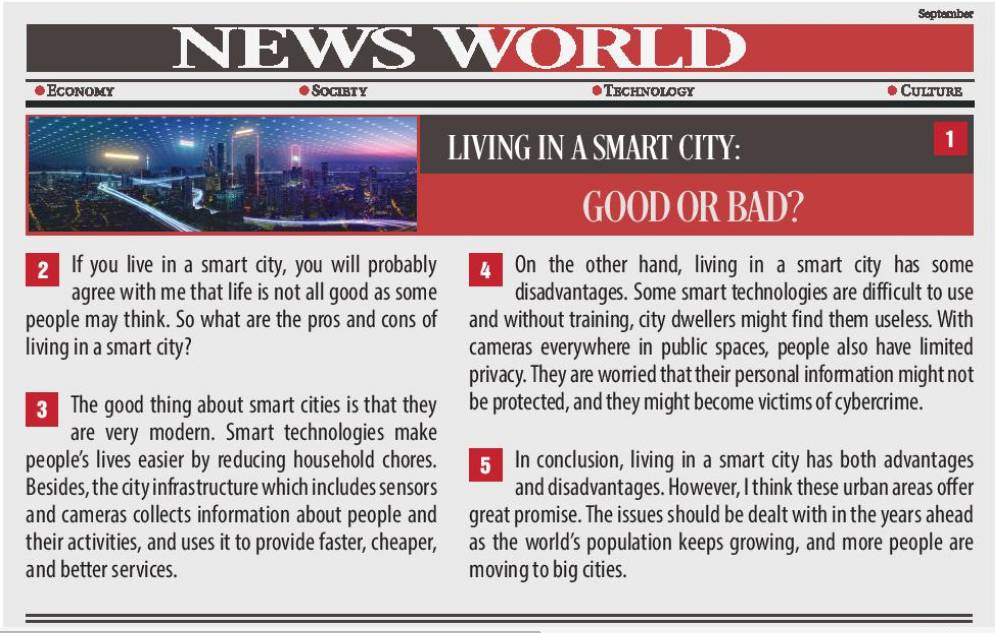Hãy nhập câu hỏi của bạn vào đây, nếu là tài khoản VIP, bạn sẽ được ưu tiên trả lời.

Tham khảo:
THE ADVANTAGES AND DISADVANTAGES OF SMART CITIES
Smart cities are built on new technologies to improve people's lives. The idea of living in one of them sounds very exciting. But is a life controlled by smart technologies good or bad for us?
Let’s start with the advantages. One of the biggest advantages of smart cities is the high level of convenience they offer. With smart technologies in place, people can access information and services quickly and easily. This makes daily life more efficient and saves people a lot of time. Additionally, smart cities are designed to be more sustainable, with green spaces and public transport options to reduce pollution.
What about the disadvantages? One of the main concerns people have about smart cities is the potential loss of privacy. With sensors and cameras constantly monitoring people's movements, there is a risk that sensitive information could be collected and shared. This can lead to a lack of trust and a feeling of being constantly watched. Furthermore, there are concerns about the potential for technology failures and the risks posed by hackers.
In conclusion, there are both advantages and disadvantages of living in a smart city. In my opinion, the benefits of smart technologies outweigh the drawbacks. However, it is important that measures are put in place to protect people's privacy and ensure the safety of their personal information. As long as these concerns are addressed, smart cities have the potential to revolutionize the way we live and work.

Living in a smart city brings many benefits and disadvantages. In this article, I will present some pros and cons of living in a smart city.
The first advantage of living in a smart city is convenience. Information and communications technology is integrated into urban systems, helping to provide public services more effectively. For example, through mobile applications, people can easily search for information about transportation, destinations, and entertainment activities. Furthermore, the smart traffic system helps reduce congestion and save travel time.
Another advantage of smart cities is energy saving and environmental protection. Advanced technologies are applied to manage and use resources effectively. For example, automatic lighting and temperature regulation in buildings help save energy. In addition, the use of smart public transport and self-driving cars helps reduce polluting emissions.
However, living in a smart city also has disadvantages. One of them is the issue of information security. With the widespread use of information technology, the risk of personal information insecurity and privacy violations increases. This requires strong security measures to ensure the safety of people's personal data.
Another drawback of smart cities is their dependence on technology. If technology systems fail or are attacked, public services could be disrupted. This poses challenges for maintaining stability and ensuring security of smart cities.
In short, living in a smart city brings many benefits such as convenience and energy savings. However, it is also necessary to pay attention to information security issues and dependence on technology. To make the most of the advantages and minimize the disadvantages, smart investment and management from city managers is needed.

Living in a sustainable city has numerous advantages, including access to clean and renewable energy sources, efficient public transportation systems, and a strong sense of community. Sustainable cities also tend to have better air and water quality, as well as more green spaces for residents to enjoy. Additionally, sustainable cities often prioritize local and organic food production, leading to healthier and more environmentally friendly food options. However, there are also some disadvantages to living in a sustainable city, such as higher cost of living, potential limitations due to regulations and restrictions, and ongoing challenges related to waste management and pollution.
Living in a smart city brings many benefits and disadvantages. In this article, I will present some pros and cons of living in a smart city.
The first advantage of living in a smart city is convenience. Information and communications technology is integrated into urban systems, helping to provide public services more effectively. For example, through mobile applications, people can easily search for information about transportation, destinations, and entertainment activities. Furthermore, the smart traffic system helps reduce congestion and save travel time.
Another advantage of smart cities is energy saving and environmental protection. Advanced technologies are applied to manage and use resources effectively. For example, automatic lighting and temperature regulation in buildings help save energy. In addition, the use of smart public transport and self-driving cars helps reduce polluting emissions.
However, living in a smart city also has disadvantages. One of them is the issue of information security. With the widespread use of information technology, the risk of personal information insecurity and privacy violations increases. This requires strong security measures to ensure the safety of people's personal data.
Another drawback of smart cities is their dependence on technology. If technology systems fail or are attacked, public services could be disrupted. This poses challenges for maintaining stability and ensuring security of smart cities.
In short, living in a smart city brings many benefits such as convenience and energy savings. However, it is also necessary to pay attention to information security issues and dependence on technology. To make the most of the advantages and minimize the disadvantages, smart investment and management from city managers is needed.

Living in a smart city brings many benefits and disadvantages. In this article, I will present some pros and cons of living in a smart city.
The first advantage of living in a smart city is convenience. Information and communications technology is integrated into urban systems, helping to provide public services more effectively. For example, through mobile applications, people can easily search for information about transportation, destinations, and entertainment activities. Furthermore, the smart traffic system helps reduce congestion and save travel time.
Another advantage of smart cities is energy saving and environmental protection. Advanced technologies are applied to manage and use resources effectively. For example, automatic lighting and temperature regulation in buildings help save energy. In addition, the use of smart public transport and self-driving cars helps reduce polluting emissions.
However, living in a smart city also has disadvantages. One of them is the issue of information security. With the widespread use of information technology, the risk of personal information insecurity and privacy violations increases. This requires strong security measures to ensure the safety of people's personal data.
Another drawback of smart cities is their dependence on technology. If technology systems fail or are attacked, public services could be disrupted. This poses challenges for maintaining stability and ensuring security of smart cities.
In short, living in a smart city brings many benefits such as convenience and energy savings. However, it is also necessary to pay attention to information security issues and dependence on technology. To make the most of the advantages and minimize the disadvantages, smart investment and management from city managers is needed.




Bài mk tham khảo từ một số trang web nhé
AI (Artificial Intelligence), is artificial intelligence, is intelligence demonstrated by machines, as opposed to natural human intelligence, which is commonly used to describe machines. AI is a great achievement of modern science, if you know how to apply it, it will bring a lot of benefits to you such as it can detect and limit risks, help people predict risks. of all mankind such as epidemics, natural disasters,... Next, AI was born to help people save more and more labor because of its high automation ability. Thanks to AI, humans can reduce labor in operating the line. There is also a language bridge, unleashing creativity,... It also helps us to create texts from words. self-synthesizing computer data, converting human speech into a form that can be understood by computer applications, providing data as well as computing technologies. The positive change that AI can bring, but there is also considerable anxiety surrounding the technology. As AI continues to become more advanced, the repetitive jobs of bankers are likely to be completely replaced by artificial intelligence. Therefore, it is very important to increase the benefits that outweigh the risks of artificial intelligence to life.
Tham khảo
Nowadays, many thousands of A.I. applications are so popular that they are not even thought of as being A.I. anymore. However, it has been noted that there are both advantages and disadvantages to relying on these intelligent machines.
Automated machinery is efficient in manufacturing and makes retail easier. Many large factories use fully automated systems that receive raw materials at the start of a production line and output a packaged product at the end. Machines can also load trucks with the packaged products for delivery to customers. In addition to its applications in manufacturing, automated machinery can also be used to save lives and help people to heal. For example, in the hospital, an automated breathing machine can help a patient to breathe, an automated dialysis machine can clean a kidney patient’s blood, and an automated X-ray machine can provide reliable X-ray images for the doctor to use in discovering the exact cause of an illness.
However advantageous, one of the great disadvantages of automated machinery is the potential loss of information or even human lives. The production line in a factory, or the treatment process of a patient, can be interrupted if a power failure happens. Moreover, automated machines or robots could fail to work properly if they were damaged or hacked by wrongdoers. If a military drone was hacked or malfunctioned, innocent people could be hurt or killed.
Taking everything into consideration, the advantages of using automated machines outweigh their disadvantages. With the advances in technologies occurring now and in the future, there is the very real potential for a better world and human life extension.